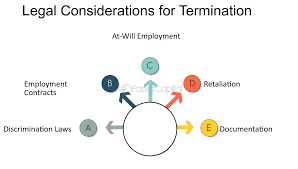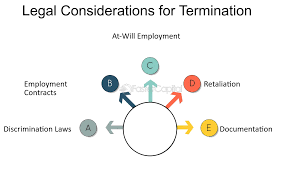
Avoid Legal Nightmares: Must-Know Termination and Severance Laws That Protect Your Business
Introduction
Termination And Severance Legal Considerations;
Termination and severance are crucial aspects of employment law that every organization must handle with diligence and care. Ensuring compliance with legal requirements during these processes not only safeguards the company against potential legal disputes but also upholds the rights and dignity of departing employees.
Terminating an employee is never easy. Whether due to performance issues, restructuring, or economic necessity, letting someone go brings not only emotional tension but serious legal consequences. In today’s regulatory climate, improper handling of employee termination and severance can lead to costly lawsuits, damaged reputations, and disrupted operations. Employers often underestimate the importance of understanding legal obligations, inadvertently putting their organizations at risk. That’s why it’s critical to understand the legal framework surrounding termination and severance before making that final decision.
From wrongful dismissal claims to violations of employment standards, every misstep during a termination can quickly escalate into a full-blown legal dispute. This risk multiplies when businesses operate across multiple jurisdictions or deal with complex employment contracts. Without solid legal knowledge or professional guidance, even a well-meaning termination can become a litigation nightmare. For example, failing to offer adequate severance pay, not documenting performance issues, or violating anti-discrimination laws are all grounds for legal action.
Yet, when handled correctly, the termination process can be smooth, professional, and legally sound. The key lies in being proactive—knowing your obligations, respecting employee rights, and carefully crafting the legal language of termination and severance agreements. These agreements are more than just documents; they are shields that protect both employer and employee when employment ends.
In this article, we’ll walk you through the most critical legal considerations for termination and severance. We’ll cover everything from the basic legal framework and notice periods to severance pay entitlements, enforceability of release clauses, and pitfalls to avoid. Whether you’re an HR manager, a business owner, or a legal advisor, this guide will empower you with the tools and knowledge to make termination decisions confidently and lawfully.
Understanding your responsibilities doesn’t just protect you from lawsuits—it also preserves company morale, supports ethical practices, and reinforces your reputation as a fair and compliant employer. It’s time to turn a traditionally negative process into an opportunity for clarity, protection, and mutual respect.
This article provides a comprehensive overview of legal considerations for termination and severance, offering insights into best practices, legal obligations, and strategies for managing these critical employment matters.
1. Understanding Termination and Severance
Termination refers to the end of an employee’s tenure with an organization, whether through resignation, dismissal, or retirement. Severance, on the other hand, pertains to the compensation and benefits provided to an employee upon termination. Navigating the legal aspects of both is essential for minimizing legal risks and ensuring fair treatment of employees.
Termination:
This process can be voluntary, initiated by the employee, or involuntary, where the employer ends the employment relationship. Involuntary terminations may be due to various reasons, including performance issues, company downsizing, or misconduct.Severance:
Severance packages typically include financial compensation, continuation of benefits, and other support services. These packages are often outlined in employment contracts or company policies and can vary based on factors such as length of service and position.
2. Legal Requirements for Termination
Understanding and adhering to legal requirements for termination is crucial to avoid wrongful dismissal claims and other legal challenges. Key considerations include:
Employment Contracts:
Review the terms of the employment contract to ensure compliance with any specific provisions related to termination. Contracts may outline notice periods, grounds for termination, and severance entitlements.Notice Periods:
Most jurisdictions require employers to provide advance notice of termination or compensation in lieu of notice. The length of the notice period can vary based on local labor laws, employment contracts, and the employee’s length of service.Just Cause:
When terminating an employee for performance issues or misconduct, ensure that there is sufficient evidence and a clear, documented history of the issues. Employers must follow a fair and transparent process to demonstrate just cause for termination.Anti-Discrimination Laws:
Ensure that terminations are not discriminatory based on race, gender, age, disability, or other protected characteristics. Compliance with anti-discrimination laws is essential to avoid legal claims and uphold workplace fairness.Employee Rights:
Respect employees’ legal rights during the termination process. This includes providing any required final pay, accrued leave, and other entitlements as mandated by local labor laws.
3. Severance Pay and Benefits
Severance pay and benefits play a significant role in the termination process, and understanding legal obligations is crucial for compliance and fairness:
Severance Agreements:
Clearly outline severance terms in a written agreement, including the amount of severance pay, continuation of benefits, and any other support provided. Ensure that the agreement is compliant with legal requirements and reflects the terms agreed upon with the employee.Calculation of Severance Pay:
Severance pay is often calculated based on factors such as length of service, position, and company policy. Ensure that calculations are accurate and align with legal standards and contractual obligations.Continuation of Benefits:
Determine whether to continue benefits such as health insurance or retirement contributions during the severance period. Comply with any legal requirements related to benefits continuation and provide clear information to the departing employee.Release of Claims:
Severance agreements may include a release of claims, where the employee agrees not to pursue legal action against the employer. Ensure that any release of claims is legally enforceable and clearly communicated to the employee.
4. Best Practices for Termination and Severance
Implementing best practices can help manage terminations and severance effectively while minimizing legal risks:
Document Everything:
Maintain thorough documentation of all termination-related processes, including performance reviews, disciplinary actions, and communications with the employee. Documentation serves as evidence of compliance and fair treatment.Conduct Exit Interviews:
Conduct exit interviews to gather feedback and address any remaining concerns the employee may have. This process can provide valuable insights for improving workplace practices and addressing potential issues proactively.Provide Support:
Offer support services such as career counseling, job placement assistance, and mental health resources to departing employees. Providing support helps ease the transition and demonstrates a commitment to employee well-being.Ensure Compliance:
Regularly review and update termination and severance policies to ensure compliance with evolving labor laws and regulations. Seek legal counsel to address complex situations and ensure that all practices are legally sound.
5. Managing Legal Risks
Proactively managing legal risks associated with termination and severance is essential for protecting the organization and avoiding costly legal disputes:
Consult Legal Experts:
Engage with legal experts to navigate complex termination and severance issues. Legal counsel can provide guidance on compliance, review severance agreements, and assist in managing potential disputes.Avoid Retaliation:
Ensure that terminations are not perceived as retaliatory actions in response to employee complaints or protected activities. Retaliation claims can lead to legal challenges and damage the company’s reputation.Handle Disputes Promptly:
Address any disputes or concerns raised by the departing employee promptly and professionally. Prompt resolution of issues can prevent escalation and potential legal claims.Train Management:
Provide training for managers and HR personnel on legal considerations for termination and severance. Training ensures that those involved in the process understand their responsibilities and comply with legal requirements.
6. Conclusion
Legal considerations for termination and severance are critical for maintaining fair employment practices and protecting both employees and the organization. By understanding and adhering to legal requirements, implementing best practices, and proactively managing legal risks, companies can navigate the complexities of termination and severance effectively. Clear communication, thorough documentation, and a commitment to fair treatment contribute to a positive and compliant termination process. Ultimately, a well-managed approach to termination and severance not only safeguards the organization against legal challenges but also supports departing employees in their transition, fostering a positive and respectful work environment.
Termination and severance don’t have to be dreaded tasks riddled with legal uncertainty. As we’ve explored, understanding the critical legal considerations can be the difference between a smooth exit and a costly courtroom battle. From navigating state and federal laws to ensuring fair severance practices and lawful dismissals, every step in the termination process carries weight. Employers must act with both empathy and precision, ensuring they uphold their legal and ethical duties without compromising their organizational goals.
A major takeaway from this discussion is the power of documentation. Proper records—of employee performance, disciplinary actions, company policies, and communications—can provide essential protection in the event of a dispute. When legal claims arise, the truth is often in the paperwork. Without it, even the most justified termination can look suspicious.
Moreover, severance agreements play a strategic role in risk management. A well-drafted agreement doesn’t just offer financial compensation—it can legally insulate the employer from future claims, provided the release language is compliant and the terms are fair. It’s crucial to work with experienced legal counsel when drafting or reviewing these agreements, especially if the termination involves sensitive issues such as age discrimination, medical leave, or retaliation claims.
Employers should also remember the human side of the termination process. The way an employee is let go can influence not just potential litigation but the morale of the remaining workforce. Being transparent, respectful, and legally compliant doesn’t just make good legal sense—it’s good business practice. Providing clear reasons, offering support like outplacement services, and ensuring open communication can go a long way in preserving professional relationships and protecting your brand.
Ultimately, the goal isn’t just to avoid legal trouble—it’s to create a workplace where policies are clear, employees feel valued, and risks are minimized. With strong legal foundations, proactive planning, and the right team by your side, termination can be handled with confidence, fairness, and integrity.
Don’t wait until you’re facing a lawsuit to understand the legal landscape. Take action today. Review your termination policies, revisit your severance templates, and ensure your team is trained to navigate these challenging scenarios wisely. A legally sound approach to termination isn’t just about defense—it’s about building a culture of trust, accountability, and compliance.
Contact Us
For premier legal research services in employment law cases in Nigeria, contact Chaman Law Firm today. Our offices are conveniently located in Lagos, FCT Abuja, Ogun State, and the UK. We are readily available to assist you with your legal needs. Whether you require consultation, representation, or ongoing legal support, Chaman Law Firm is your trusted partner in navigating employment law in Nigeria.
Call us at 08065553671 or email us at info@chamanlawfirm.com to schedule a consultation.
- Wage and Hour Laws
- Discrimination and Harassment
- Wrongful Termination
- Employee Benefits and Compensation
- Workplace Health and Safety (OSHA Compliance)
Chaman Law Firm: Your Trusted Legal Partner in Employment Law
By choosing Chaman Law Firm, you are selecting a team of dedicated professionals committed to providing exceptional legal services tailored to your unique needs. Let us be your advocate and guide in the complex world of employment law, ensuring your interests are protected and your goals are achieved.


